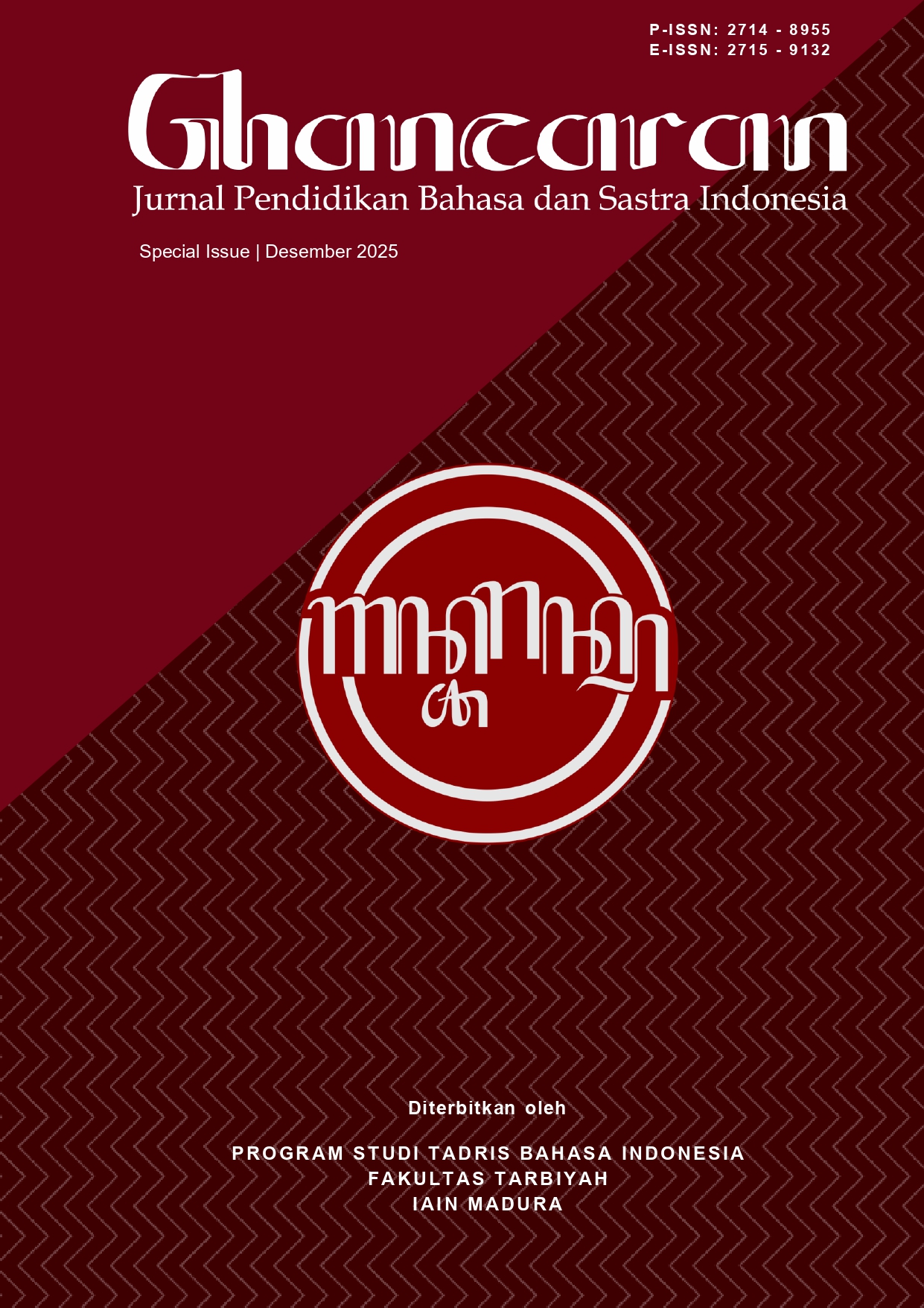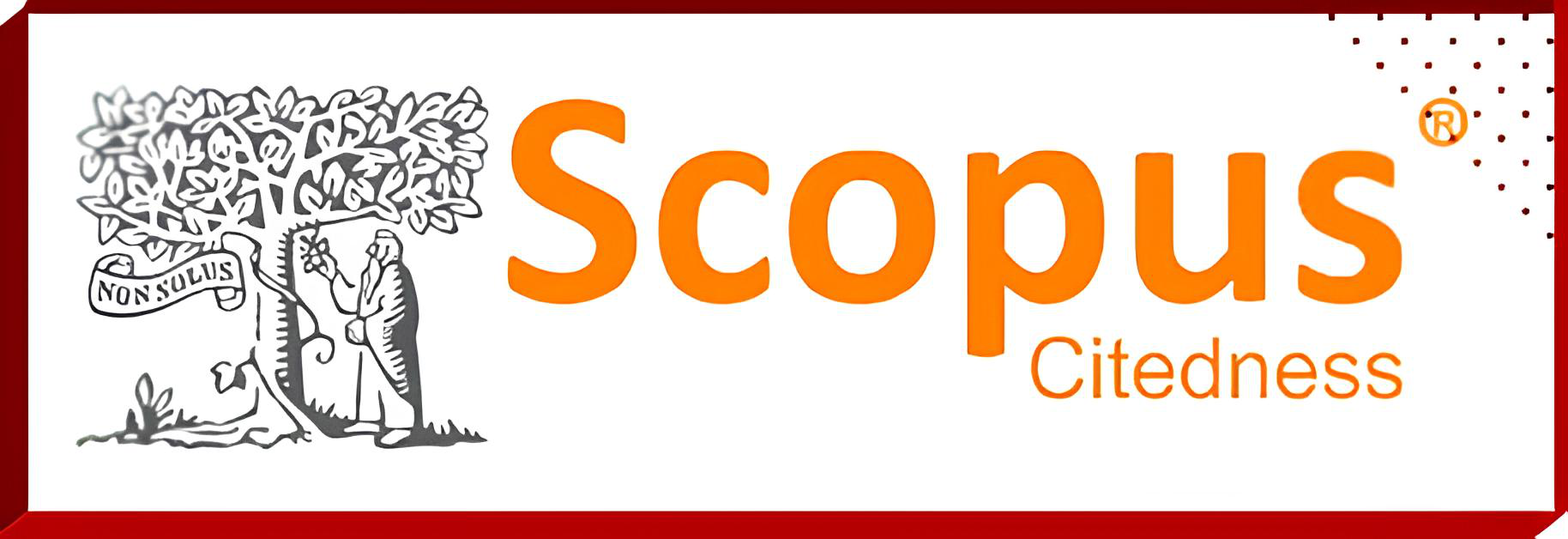Disrupting Patriarchy Through Critical Literacy: A Textual and Pedagogical Analysis of Faqihuddin Abdul Kodir’s Writings on Gender Justice in Contemporary Indonesia
 Abstract views: 172
,
Abstract views: 172
,
 PDF downloads: 77
PDF downloads: 77
Abstract
Patriarchal narratives in Indonesian educational and religious texts continue to reproduce gender inequality, making critical literacy an urgent pedagogical approach. This study aims to examine how the works of Faqihuddin Abdul Kodir contribute to promoting gender justice in language education through critical literacy practices. Employing a qualitative case study design, the research involved interviews, classroom observations, and document analysis with language teachers and education students in Cirebon who engaged with Faqihuddin’s writings and mubadalah framework. The findings reveal that teachers and students developed greater awareness of gender bias in texts and adopted reflective reading strategies to internalize ethical values such as justice and reciprocity. Teachers began to integrate inclusive language and encourage rewriting exercises from female perspectives, which positioned students as agents of social change. Furthermore, educators started to redefine their professional roles from mere linguistic instructors to facilitators of social justice. These results demonstrate the transformative potential of gender-just critical literacy pedagogy in both Islamic and multilingual educational contexts. This study concludes that integrating gender-conscious texts and reflective practices can enrich language classrooms, advance gender equality, and offer a progressive Islamic contribution to global critical literacy discourse.
Downloads
References
Alade, I. A. (2012). Gender Stereotyping and Empowerment in Nigeria Society: Implications for Women Repositioning in Curriculum Delivery. AFRREV LALIGENS: An International Journal of Language, Literature and Gender Studies, 1(1), 30–43.
Alameddine, M. M., & Chehimi, G. (2024). Addressing Feminist and Gender Issues in ESL Classrooms: An Exploratory Study. American Journal of Science Education Research.
Amber, A. (2024). Hands of God at work: Chapter 6. Mubadalah is in-between.
Anggoro, R. (2019). Mubadalah sebagai Metode Tafsir Progresif: Membaca Ulang Teks Keagamaan untuk Keadilan Gender. Jurnal Studi Gender Indonesia, 11(2), 125–140.
Bazerman, C. (2019). Scientific Writing as A Social Act: A Review of The Sociology of Science. In New Essays in Technical and Scientific Communication (pp. 156–184). Routledge.
Byrne, D. (2022). A Worked Example of Braun and Clarke’s Approach to Reflexive Thematic Analysis. Quality & Quantity, 56(3), 1391–1412.
Creswell, J. W., & Poth, C. N. (2018). Qualitative Inquiry and Research Design: Choosing Among Five Approaches (4th ed.). SAGE Publications.
Fairclough, N. (2013). Critical Discourse Analysis: The Critical Study of Language. Routledge.
Fajriah, N., Kusnadi, D., & Imranudin, I. (2020). How Indonesian EFL Students Criticize Texts and Reconstruct Gender Equality Through Critical Framing. Linguistics, Literature and English Teaching Journal, 12(1), 1–14.
Freire, P. (2018). Pedagogy of the Oppressed (50th anniversary ed.). Bloomsbury.
Freire, P. (2020). Pedagogy of the Oppressed. In Toward a Sociology of Education (pp. 374–386). Routledge.
Gee, J. P. (1989). Literacy, Discourse, and Linguistics: Introduction. Journal of Education, 171(1), 5–17.
Główka, D. (2014). The Impact of Gender on Attainment in Learning English as A Foreign Language. Studies in Second Language Learning and Teaching, 4(4), 617–635.
Govender, N. N. (2019). Critical Literacy And Critically Reflective Writing: Navigating Gender And Sexual Diversity. English Teaching: Practice & Critique, 18(3), 351–364.
Guetterman, T. C., & Fetters, M. D. (2018). Two Methodological Approaches to The Integration of Mixed Methods and Case Study Designs: A Systematic Review. American Behavioral Scientist, 62(7), 900–918.
Gumiandari, S., & Nafi’a, I. (2020). Mubadalah as an Islamic Moderating Perspective Between Gender and Patriarchal Regimes in Building Family Resilience. Jurnal Penelitian, 17(2), 107–116.
Handayani, T., & Hadi, S. (2021). Mubadalah sebagai Teori Progresif: Membaca Ulang Relasi Gender dalam Islam. Jurnal Kajian Gender dan Anak, 6(2), 45–58.
Hooks, B. (1994). Teaching to Transgress: Education as the Practice of Freedom. Routledge.
Howley, J. A. (2023). Reading Against the Grain. In Forgery Beyond Deceit: Fabrication, Value, and The Desire for Ancient Rome (pp. 93–110). Cambridge University Press.
Janks, H. (2010). Literacy and power. Routledge.
Janks, H. (2012). The Importance of Critical Literacy. English Teaching: Practice and Critique, 11(1), 150–163.
Jule, A. (2016). Gender, Participation and Silence in the Language Classroom. Palgrave Macmillan.
Keddie, A. (2022). Engaging Boys in Gender Transformative Pedagogy: Navigating Discomfort, Vulnerability and Empathy. Pedagogy, Culture & Society, 30(3), 401–414.
Kodir, F. A. (2019a). Qira’ah Mubadalah: Tafsir Progresif untuk Keadilan Gender dalam Islam. IRCiSoD.
Kodir, F. A. (2025). Fiqh al-Usrah: Fondasi Akhlak Mulia dalam Hukum Keluarga. Afkaruna.
Kodir, F. A. (2016). Mafhum mubādalah: Ikhtiar memahami Qur’an dan Hadits untuk meneguhkan keadilan resiprokal Islam dalam isu-isu gender. Jurnal Islam Indonesia, 6(2).
Kodir, F. A. (2017). 60 Hadis Hak-Hak Perempuan dalam Islam: Teks dan Interpretasi. Umah Sinau Mubadalah.
Luke, A. (2000). Critical Literacy in Australia: A Matter of Context And Standpoint. Journal of Adolescent & Adult Literacy, 43(5), 448–461.
Luke, A. (2012). Critical Literacy: Foundational Notes. Theory into Practice, 51(1), 4–11.
Mezmir, E. A. (2020). Qualitative Data Analysis: An Overview of Data Reduction, Data Display, and Interpretation. Research on Humanities and Social Sciences, 10(21), 15–27.
Nandi, A., Hader, T., & Das, T. (2024). Gender Stereotypes and Bias in English Language School Textbooks: Reflection from Literature Review Across Different Countries. An-Nisa Journal of Gender Studies, 17(2), 133–148.
Owen, G. T. (2014). Qualitative Methods in Higher Education Policy Analysis: Using Interviews and Document Analysis. The Qualitative Report, 19(26), 1–19.
Psaki, S. R., McCarthy, K. J., & Mensch, B. S. (2018). Measuring Gender Equality in Education: Lessons from Trends in 43 Countries. Population and Development Review, 44(1), 117–142.
Rohmawati, S., & Putra, K. A. (2022). Occupational Gender Stereotypes in Indonesian Secondary School English Language Textbooks. Voices of English Language Education Society, 6(1), 160–175.
Rokhmah, A. (2022). Gender Equality in Education: Perspective of Mubadalah. In Proceedings of the International Conference on Islamic Studies (ICIS) (pp. 954–961).
Rymes, B., Lee, E., & Negus, S. (2024). Language and Education: Ideologies of Correctness. Annual Review of Anthropology, 53, 297–314.
Şeker, M., & Dinçer, A. (2014). An Analysis of Gender Stereotyping in English Teaching Course Books. Çukurova Üniversitesi Eğitim Fakültesi Dergisi, 43(1), 90–98.
Syukri, M., Hasanah, R., & Maulida, S. (2024). Designing a Gender-Responsive Qirāʾah Learning Module in Islamic Higher Education. Islam Futura, 24(2), 233–252.
Tyarakanita, A., Drajati, N. A., Rochsantiningsih, D., & Nurkamto, J. (2021). The Representation of Gender Stereotypes in Indonesian English Language Textbooks. Sexuality & Culture, 25(3), 1140–1157.
Waluyo, B. (2024). Integrating Gender Awareness Into EFL Pedagogy: Insights from Indonesia’s Islamic Universities. Issues in Educational Research, 34(3), 1180–1201.
Weng, T. H. (2023). Creating Critical Literacy Praxis: Bridging the Gap Between Theory and Practice. RELc Journal, 54(1), 197–207.
Winhar, A. A. P., Nugroho, H. R. S., & Candraningrum, D. (2021). Cultivating Gender Sensitivity and Critical Reading Skills Using Fiction: A Classroom Action Research for The Students of English Department. Salasika, 4(2), 107–133.
Wright, W. S. (2024). Rewriting Resistance to Social Justice Pedagogies: Student Engagement in The Composition Classroom. Rowman & Littlefield.
Copyright (c) 2025 GHANCARAN: Jurnal Pendidikan Bahasa dan Sastra Indonesia

This work is licensed under a Creative Commons Attribution-ShareAlike 4.0 International License.
Ghancaran: Jurnal Pendidikan Bahasa dan Sastra Indonesia uses an Open Access Policy under the Creative Commons Attribution-ShareAlike 4.0 International License. Authors publishing in this journal agree to the following terms:
- Ghancaran Journal holds the copyright and grants the journal rights for first publication with the work simultaneously licensed under a

The work is distributed under Creative Commons Attribution-ShareAlike 4.0 International License which allows others to share, copy, and redistribute the material in any media or format and adapt, remix, change, and develop the material even for commercial purposes, as long as it is stated credit and license derivative works under similar terms. - Authors may make additional contractual arrangements for non-exclusive distribution of the journal's published work version.
- Authors are permitted to post their work online (e.g., in institutional repositories or on their websites) before and during submission, as doing so may lead to productive exchange.



















